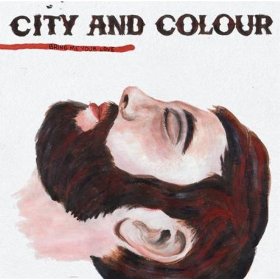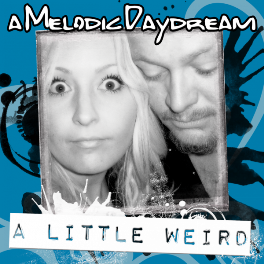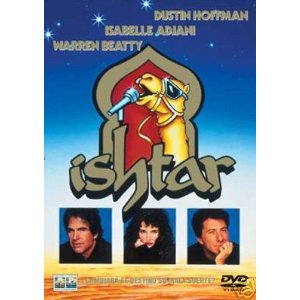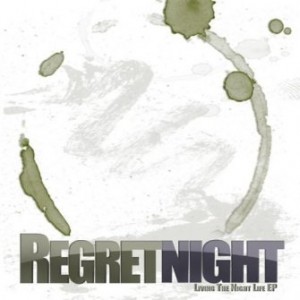It’s no secret that I am a fan of Churchill. I’ve been watching their progress here in Denver with great interest ever since I first saw them play. In less than a year’s time as a band, they have put out a great first EP, earned a Top 3 slot in Channel 93.3’s Hometown for the Holidays, and a couple of weeks ago, joined some of Denver’s best local bands at SXSW.
Last week, I finally got a chance to have an extended conversation with the band–well, two-thirds of them, anyhow: Tim Bruns, Mike Morter, Amy Moyer and Tyler Rima. (Bandmates Bethany Kelley and Joe Richmond, were performing with Meese on the road as they did some shows with Switchfoot.) We gathered in Tim and Mike’s living room to talk about Churchill’s unique sound, their influences, their friendship with Meese (with whom Tim and Mike share a duplex), and their direction as a band. A good portion of the conversation is transcribed below. Fans who have been looking for the next EP from Churchill may find a surprise toward the end of the interview…
OOMPH: One thing that’s particularly striking about you as a band is the sound that you have. I’m curious to know how you came about it. How did you arrive at your particular sound, and what made you choose the instruments that go into it?
TIM: Mike and I have been playing together for years, and it was always me on guitar, and him on mandolin…the first EP was sort of like Mike’s and my direction, and not a lot of people doing what they do…especially like with Tyler on bass…
TYLER: I recorded my bass parts after knowing you guys for a week…
TIM: …so we basically had to tell him what to play, and that was how it started. But the more we’ve been playing together, we’ve kind of fallen into the sound we have now.
AMY: Yeah, I don’t think it was ever–we never came up with a formula of what bands we wanted to take from and sound like…we wanted everything to be as natural as possible, so that’s kind of how it happened. And now that’s why people are like, “You don’t sound like any other band.”
OOMPH: What does the songwriting process look like for you? What sorts of things inspire you to write?
TIM: Well, with the stuff we’ve been writing, a lot of it’s like, I’ll write a song or an idea, or a chorus, and bring it down in the basement, and we just kind of build around it, and everyone kind of writes their part.
TYLER: I mean, a lot of times you’ve brought a full song to us, and the song that we end up with is not what it started off as. Like “Miles”, that drivey rock song [we do] started off as a full bluegrass song.
TIM: Everything I write is like country…
TYLER: And then Joe and I come from a rock background. And the two girls have their sort of direction, and [Tim and Mike] have their sort of direction, and it’s one of these things where it might be a [finished] song, but once everyone gets their hands on it, it usually ends up different…
AMY: I never realized that before, because [Tim and Mike] had that sound like bluegrass, and [Joe and Tyler] were rock, and Bethany and I are more like–I grew up with classical and orchestra [background] since the third grade, and Bethany being in chorale…
TYLER: It’s been really awesome…we’re kind of like a big family for being so randomly assembled.
OOMPH: It sounds like almost like a confluence of three types of backgrounds. Is there any kind of a collective influence? Are there any bands that particularly inspire you more than others?
TIM: As a whole, it’s like what we’re kind of listening to at the time, like one of us will pass it around…
TYLER: As a band, we have few records that we all listen to together, I mean, anything by Radiohead…Phoenix was kind of our band’s record last year…right now I think it’s probably Margo and the Nuclear So and Sos, that’s the band we’ve all been listening to…
MIKE: Tim and I have been on kick with Switchfoot…
TIM: Which the other two members of the band [Bethany and Joe] are playing shows with right now…
TYLER: That’s why this place is so quiet–the Meese guys live right there [in the other side of the duplex]…
TIM: Yeah, it’s like a ghost town… [laughter]
TYLER: We’ve sort of adapted to each other’s musical tastes a little bit. Being on the road has helped with that. We’ve all gotten to hear what each other would listen to, because we have a lot of time to kill.
OOMPH: I’m curious as to how the friendship/partnership with Meese has come about. How did that all happen?
TIM: It goes back a little…I came out [to Denver in 2006] to do a record with Joe, and I met Pat and Nate (Meese) and Mike Ayers…and when we moved out here…we were all going to the Wing Stop, and for the first few months we barely knew each other, and then they came to our show…and I don’t know, somehow…
MIKE: They became like “biggest fans” of us, which was really cool, before we were really even friends.
TYLER: Before I moved out here, I didn’t know any of these guys, and I had the Meese record, and I loved it.
AMY: Yeah, same with me…
TYLER: We’ve all been fans of theirs forever, so to have any sort of compliment coming from their direction was huge to me. And then moving down here…
TIM: Well, that happened because Mike and I were living in Thornton, and we were all gonna move down here [to Denver], and I was talking to Tiffany, Pat’s wife, and she says, “Well, I found this place, it’s good rent, and we would like totally be in a duplex together. And I was like, “I don’t even care what it looks like.” [laughter]…and now that they’ve not been on tour as much, we’re hanging out all the time, writing songs…we’ve had a lot of late-night chats with those guys, and Pat and Nate have given Mike and me a lot of advice on how to do certain things…
MIKE: Businesswise–I’ve never really thought of a band as a business…so Joe and I are kind of the acting managers right now…and Pat helps out a lot and gives us a lot of good stuff to think about.
TIM: So much of where we are right now [as a band] is because of those guys.
OOMPH: How did you guys like SXSW?
[laughter]
TIM: I think we all decided it was one of the craziest weekends in our whole lives.
OOMPH: Crazy in a good way?
TYLER: Yeah…I mean, Joe and I went down there last year, but what I was doing, I was hired [for]…so for me, getting to come down, and first of all, since no one else had ever been, it was kind of like this eye opener, but then to just realize that this was with my band and this was my thing, it just felt really good…and there was just so many people and so many shows…
MIKE: It’s like Mardi Gras for bands…
TYLER: …And every place is a venue whether it’s an alley or a restaurant or a bar.
OOMPH: You guys have been a band almost a year, yet you were in the top 3 bands this year for Hometown for the Holidays, along with 2 other veteran local bands who had been in the Top 3 before. How has the established music community around you responded to the attention you’ve been getting? Do you find that they are supportive, or do you find that there’s some resistance? What do you feel?
TYLER: I think everyone has been really, really supportive…and I think that’s basically the Denver music scene in general, I think there’s no sense of competition, it’s more a sense of everyone is for everyone, which is great.
OOMPH: I think it’s an amazing dynamic, to tell you the truth, and you’re not the first band to tell me that. I’m just curious, because if anyone’s gonna get a rough time of it, it’s gonna be the newcomers that are taking off…so I think if it existed it would be targeted [to you]. But it seems like it really is a strong community.
MIKE: Yeah, it’s pretty supportive. I’d say the Denver music scene is kind of like skateboarding, like the X-Games, like whenever they do a really sweet trick, and everyone’s all, “YEAH!” [laughter]
TYLER: Everybody pushes each other, and bands always tell their friends about other bands.
TIM: Even the bigger bands, like The Fray…[Isaac Slade] saw me in the drive-thru at Starbucks the other day, and he was like, “Hey, how’s your band doing?” and “We should get together and talk…”
TYLER: The fact that he could still want to support local bands…they genuinely still care. Once you’ve made it “out”, I feel like it’s not always your responsibility to stay so invested because you’re so busy. But they still do.
OOMPH: Pretend I’m someone hearing you play for the first time. What do you hope I come away with after your show?
(For fun, Tim suggested each bandmate answer in one or two words…)
TYLER: Have fun.
TIM: Feeling good.
MIKE: Be a part.
AMY: Positivity, hope.
OOMPH: Any hints about the upcoming EP?
TYLER: It’s gonna be a full length…
ME: Oh, it’s not an EP…
TYLER: That’s a recent [development]…we’ve written too much, and we’ve developed a lot, and as much as maybe an EP is the sensible thing to do, we really want to push ourselves….
AMY: I’m really stoked about it…
TYLER: Yeah, the demos are cool…we’re gonna do it in The Fray’s studio, Candyland…
TIM: Ideally….
AMY: Cross your fingers…
ME: Any idea when it’s coming?
TIM: July, that’s the goal.
TYLER: We were gonna do an EP and we were gonna do it this month…and something clicked when we were out on the road, and we realized that we’ve got too much stuff that we really believe in.
Churchill is playing at the Hi-Dive with The Northern Way this Friday night, April 2. Show starts at 8:00 PM. Go check them out for yourself.
Churchill is:
Tim Bruns, guitar/lead vocals
Bethany Kelly, keyboard/vocals
Mike Morter, mandolin
Amy Moyer, cello
Joe Richmond, drums
Tyler Rima, bass











